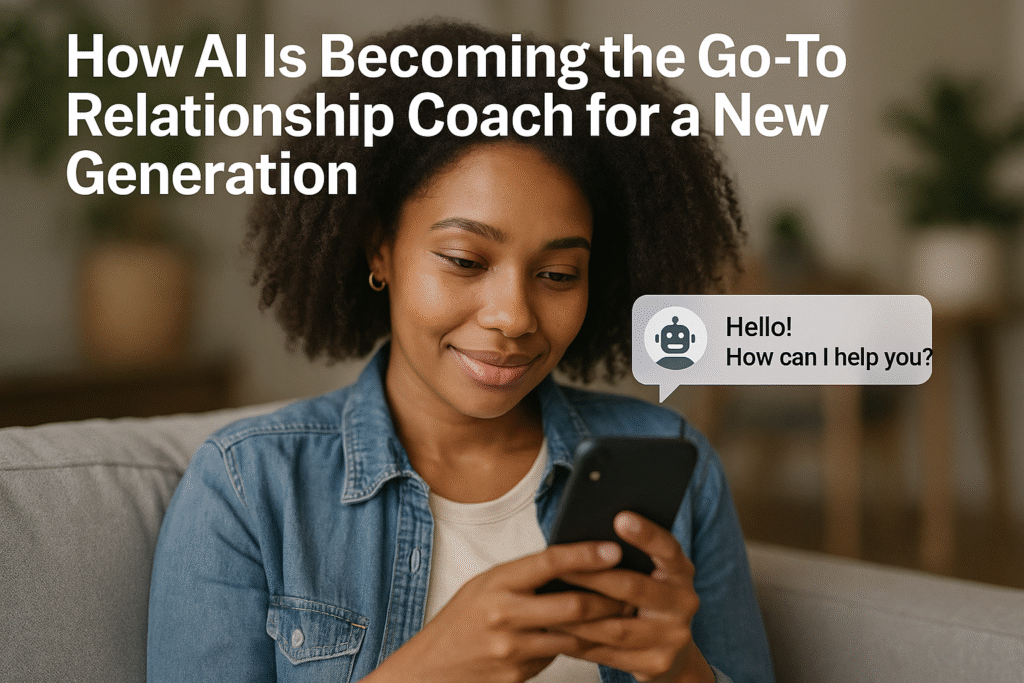By Harshit | 4 October 2025 | San Francisco | 9:00 AM EDT
Artificial intelligence is no longer just for writing résumés or drafting emails. Increasingly, people are turning to AI tools like ChatGPT to help navigate some of life’s most emotionally charged situations: dating, breakups, and relationships.
Take Rachel, a woman from Sheffield (who asked not to use her real name). Earlier this year, before meeting a man she had previously dated in a wider friendship group, she felt nervous and wanted guidance on how to handle the conversation. Having used ChatGPT for job searches, she decided to try it for relationship advice.
“I asked how do I deal with this conversation but not be on the defensive,” she says. The response surprised her. “It was like a cheerleader on my side — it told me I was self-aware and emotionally mature, and then offered tips. It reminded me to do it on my terms.”
Rachel didn’t follow the advice word-for-word but said it gave her confidence and perspective before the meeting.
A Growing Trend Among Young Adults
Rachel is part of a growing group of people using AI to navigate their love lives. According to research from dating app giant Match, nearly half of Generation Z Americans — those born between 1997 and 2012 — have used large language models (LLMs) like ChatGPT for dating advice. That’s more than any other generation.
People are using AI to write breakup messages, decode confusing texts, and dissect the dynamics of their relationships. While some find it empowering, experts warn that relying on AI too heavily can have drawbacks.
Expert Perspective: A Tool, Not a Therapist
Psychologist and relationship expert Dr. Lalitaa Suglani says AI can be a valuable tool for people who feel overwhelmed by relationship issues or struggle with communication.
“It can help them craft a text, process a confusing message, or offer a moment of pause instead of being reactive,” she says. “In many ways, it can function like a journaling prompt or reflective space, which can be supportive when used as a tool — but not a replacement for connection.”
However, Dr. Suglani cautions that LLMs are designed to be helpful and agreeable. They may echo back assumptions, validate unhelpful patterns, or reinforce avoidance. For example, using AI to write a breakup text could be a way to avoid the discomfort of the situation, potentially stunting emotional growth.
“If someone turns to an LLM every time they feel emotionally exposed, they might start outsourcing their intuition, emotional language, and sense of relational self,” she adds. AI-generated messages can also come across as emotionally sterile, making communication feel scripted or impersonal.
New AI Services for Relationships
Despite the challenges, new AI-powered services are emerging to meet the demand for relationship advice. One example is Mei, a free AI-generated service trained using OpenAI’s technology. The tool responds to relationship dilemmas with conversational-style answers.
“The idea is to allow people to instantly seek help to navigate relationships because not everyone can talk to friends or family for fear of judgment,” says New York-based founder Es Lee. More than half of the questions brought to Mei involve sex — a topic many feel uncomfortable discussing with friends or therapists.
However, Lee acknowledges the concerns about safety and privacy. “The stakes are higher with AI because it can connect with us on a personal level in a way no other technology has,” he says. Mei has guardrails built into its AI and limits the information it collects. Conversations are stored only temporarily for quality assurance and discarded after 30 days.
Balancing AI With Human Insight
Some people are combining AI advice with traditional therapy. Corinne, a Londoner (not her real name), turned to ChatGPT when she wanted to end a relationship last year, inspired by her housemate’s positive experience using AI for dating advice.
She even asked it to reply in the style of her favorite relationship experts, such as Jillian Turecki and Dr. Nicole LePera. “It was nice to have the advice tailored to my scenario,” she says. But Corinne also works with a therapist and treats AI advice with “a bit of distance.”
“I can imagine people ending relationships and perhaps having conversations they shouldn’t be having yet, as ChatGPT just repeats back what it thinks you want to hear,” she says. “It’s good in stressful moments. And when a friend isn’t around. It calms me down.”
The Future of Digital Relationship Advice
OpenAI, the creator of ChatGPT, says it is working to make its models more responsible in sensitive situations. This includes directing people to professional help when needed and building safeguards into how the models respond to emotional requests.
Still, privacy and ethical concerns remain. AI tools could potentially collect sensitive data about users’ relationships, which might be devastating if leaked or hacked.
For now, experts recommend using AI as a supplement rather than a substitute. Whether it’s rewording a text or helping to process feelings, AI can provide a pause, a sounding board, and sometimes much-needed reassurance. But real growth — and authentic connection — still comes from human interaction.

